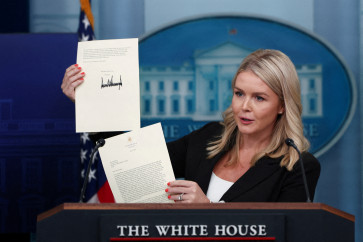Popular Reads
Top Results
Can't find what you're looking for?
View all search resultsPopular Reads
Top Results
Can't find what you're looking for?
View all search resultsMen get depressed, too, let’s talk about it
Depression is more than just “sadness” or a “low mood
Change text size
Gift Premium Articles
to Anyone
D
epression is more than just “sadness” or a “low mood.” Depression distorts one’s view of the world, making it seem bleaker than it actually is. It engenders feelings of worthlessness, helplessness and hopelessness. It prevents people from doing their best at work, school or home.
For some, depression leads to self-harm and, ultimately, suicide. On a more global scale, depression is a major disability and one of the leading causes of death worldwide.
While some conditions, such as poverty and severe illness, do increase the risk of depression, it can happen to anyone from all walks of life. However, different people experience depression differently, and this difference can determine their outcome.
Studies have consistently found that depression is almost twice as prevalent in women as in men; yet, men are up to four times more likely to commit suicide. This observation has led to a growing interest in how men experience depression differently than women, and how the experience of depression is partly shaped by the dominant traditional norms of masculinity.
Across cultures, men are traditionally expected to be competitive and successful, to show toughness and dominance, to be self-reliant and to restrict their emotional expression; failure or refusal to conform results in stigma. While there is nothing inherently wrong with being a traditional man, rigid adherence to those norms is a risk factor for poor mental health.
Men who strongly adhere to masculine norms face barriers in seeking and accessing psychiatric help. Depression is often perceived as a personal weakness and the opposite of how men are supposed to be. Expressing emotions, including sadness in depression, is generally frowned upon, so depressed men tend to keep to themselves and withdraw from social life to keep other men from seeing signs of their depression.
Deprived of emotional expression, traditionally masculine men exhibit a typical manifestation of depression: being more focused on physical complaints and impaired performance. People around them may feel that these men are more irritable, aggressive or withdrawn than usual. Depressed men are also more likely to turn to the harmful use of alcohol and other psychoactive substances.
Those signs and symptoms are not captured by the current criteria that doctors use to diagnose depressive episodes. Diagnosis often relies on the patients’ report of their depressed mood, but many men are unable to clearly identify and describe their feelings. Additionally, the dominance of physical complaints may cause doctors to overlook psychological problems that underlie them. These phenomena may explain why so many depressed men remain undiagnosed and, thus, untreated.
Even though evidence-based effective treatments for depression are available, traditional masculine norms may prevent men from getting the most out of them. Some men may feel conflicted in consuming antidepressants, as they see it as losing the autonomy of their own body. To regain a sense of control, men on antidepressants may modify or stop their treatment without consulting their doctors first. Men also tend to look down on psychotherapy, especially the forms perceived as purely “talk therapy.”
The prospect of having to explore one’s deepest feelings and conflicts may turn some men away from psychotherapy, too.
These challenges make the World Health Organization’s campaign for World Health Day on April 7 even more relevant. “Depression: Let’s Talk” aims to break down the barriers that have kept men from seeking help for depression. Fortunately, there are several possible means to achieve this.
First, we should stop chastising men for talking about their feelings. Instead, healthy emotional expression should be encouraged and given a receptive environment. Depression is a medical condition, not a character flaw or personal weakness. It cannot be solved by telling men to “man up” or “grow a pair.”
Second, we need to talk more about male depression. Successful public health campaigns have used examples of traditionally masculine men coming forward with their stories of battling depression. Depressed men are more likely to seek help when they know that depression is not such a strange or rare thing. Furthermore, we can help men see that seeking help for and controlling their depression is a sign of courage and strength, rather than weakness and dependency.
To better diagnose depression among men, we need to be aware of how men manifest depression, especially those masked by physical complaints, work and relationship problems, aggression, social withdrawal or substance abuse. Specific diagnostic criteria have also been put forward to help doctors detect male depression in clinical practice.
Mental health practitioners should adopt a gender-sensitive approach to the treatment of depression to achieve optimal outcome. Men prefer a more collaborative patient-doctor relationship in which they actively take part in formulating treatment decisions.
Gender-related conflicts that men face when consuming antidepressants must be properly addressed to ensure treatment compliance. Also, men are more comfortable working through practical, action-focused forms of psychotherapy, such as cognitive-behavioral therapy, which trains them to be aware of their thoughts and behaviors.
Awareness of depression as a gendered experience, as well as adoption of a healthier view on masculinity is needed to improve detection and treatment of male depression, and it takes all of us to overcome this challenge. Talking about it is a good start.
______________________________
The writer is resident at the University of Indonesia’s School of Psychiatry.










